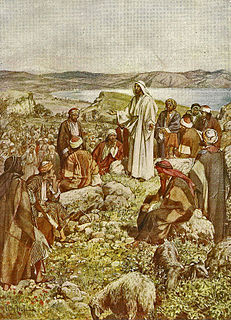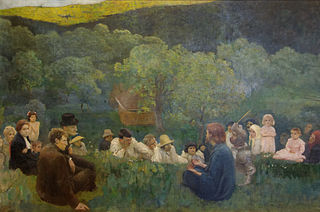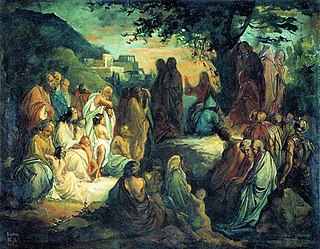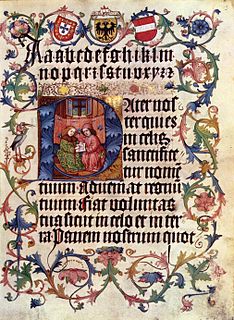
Matthew 3:2 is the second verse of the third chapter of the Gospel of Matthew in the New Testament. John the Baptist has just been introduced and this verse describes the message that he is preaching. Through John's message, Matthew introduces the "Kingdom of Heaven".

Matthew 5 is the fifth chapter of the Gospel of Matthew in the New Testament. It contains the first portion of the Sermon on the Mount, which will also take up chapters 6 and 7. Portions are similar to the Sermon on the Plain in Luke 6, but much of the material is found only in Matthew. It is one of the most discussed and analyzed chapters of the New Testament. Warren Kissinger reports that among Early Christians no chapter was more often cited by early scholars. The same is true in modern scholarship.

Matthew 5:6 is the sixth verse of the fifth chapter of the Gospel of Matthew in the New Testament. It is the fourth verse of the Sermon on the Mount, and also the fourth of what are known as the Beatitudes.

Matthew 5:12 is the twelfth verse of the fifth chapter of the Gospel of Matthew in the New Testament. It is the tenth verse of the Sermon on the Mount. This verse is generally seen as part of an expansion of the eight Beatitude, others see it as the second half of the ninth Beatitude, a small group feel it is the tenth Beatitude and thus brings to a close a second Decalogue.

Matthew 5:15 and Matthew 5:16 are the fifteenth and sixteenth verses of the fifth chapter of the Gospel of Matthew in the New Testament. They are part of the Sermon on the Mount, and is one of a series of metaphors often seen as adding to the Beatitudes. The previous verse compared the disciples to a City upon a Hill that can't be hidden. These verses present a similar analogy.

Matthew 5:20 is the twentieth verse of the fifth chapter of the Gospel of Matthew in the New Testament and is part of the Sermon on the Mount. Jesus has reported that he came not to destroy the law, but fulfill it. But in this verse, he makes clear that the common understanding of the Law is not enough.

Matthew 5:33 is the thirty-third verse of the fifth chapter of the Gospel of Matthew in the New Testament and is part of the Sermon on the Mount. This verse is the opening of the fourth antithesis, beginning the discussion of oaths.

Matthew 5:39 is the thirty-ninth verse of the fifth chapter of the Gospel of Matthew in the New Testament and is part of the Sermon on the Mount. This is the second verse of the antithesis on the command: "eye for an eye". In one of the most famous verses in the New Testament, Jesus here rejects revenge and retaliation, instead telling his followers to turn the other cheek.

Matthew 5:45 is the forty-fifth verse of the fifth chapter of the Gospel of Matthew in the New Testament and is part of the Sermon on the Mount. This is the third verse of the final antithesis, that on the commandment: "Love thy neighbour as thyself". Jesus here explains why one must love one's enemies.

Matthew 6:1 is the first verse of the sixth chapter of the Gospel of Matthew in the New Testament and is part of the Sermon on the Mount. This verse begins the discussion of how even good deeds can be done for the wrong reasons.

Matthew 6:5 is the fifth verse of the sixth chapter of the Gospel of Matthew in the New Testament and is part of the Sermon on the Mount. This verse opens discussion on the proper procedure for praying.

Matthew 6:6 is the sixth verse of the sixth chapter of the Gospel of Matthew in the New Testament and is part of the Sermon on the Mount. This verse continues the discussion on the proper procedure for praying; that is, not to do it in public, but to do it in private.

Matthew 6:25 is the twenty-fifth verse of the sixth chapter of the Gospel of Matthew in the New Testament and is part of the Sermon on the Mount. This verse shifts the discussion from one of money to one of worry.

Matthew 6:31 and Matthew 6:32 are the thirty-first and thirty-second verses of the sixth chapter of the Gospel of Matthew in the New Testament and is part of the Sermon on the Mount. This verse continues the discussion of worry about material provisions.

Matthew 6:34 is “Therefore do not worry about tomorrow, for tomorrow will worry about itself. Each day has enough trouble of its own.” It is the thirty-fourth, and final, verse of the sixth chapter of the Gospel of Matthew in the New Testament and is part of the Sermon on the Mount. This verse concludes the discussion of worry about material provisions.

Matthew 7:7–8 are the seventh and eighth verses of the seventh chapter of the Gospel of Matthew in the New Testament and is part of the Sermon on the Mount. These verses begin an important metaphor generally believed to be about prayer.

Matthew 7:11 is the eleventh verse of the seventh chapter of the Gospel of Matthew in the New Testament and is part of the Sermon on the Mount. This verse summarizes the preceding metaphors in favour of prayer.

Matthew 7:12 is the twelfth verse of the seventh chapter of the Gospel of Matthew in the New Testament and is part of the Sermon on the Mount. This well known verse presents what has become known as the Golden Rule.

Matthew 7:23 is the twenty-third verse of the seventh chapter of the Gospel of Matthew in the New Testament and is part of the Sermon on the Mount. This verse continues Jesus' warning against false prophets.

Matthew 6 is the sixth chapter of the Gospel of Matthew in the New Testament. This chapter contains the middle portion of the Sermon on the Mount, including the Lord's Prayer.





















